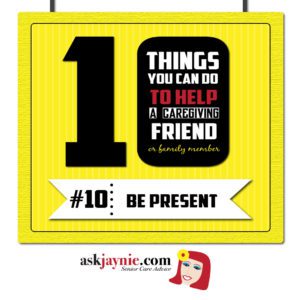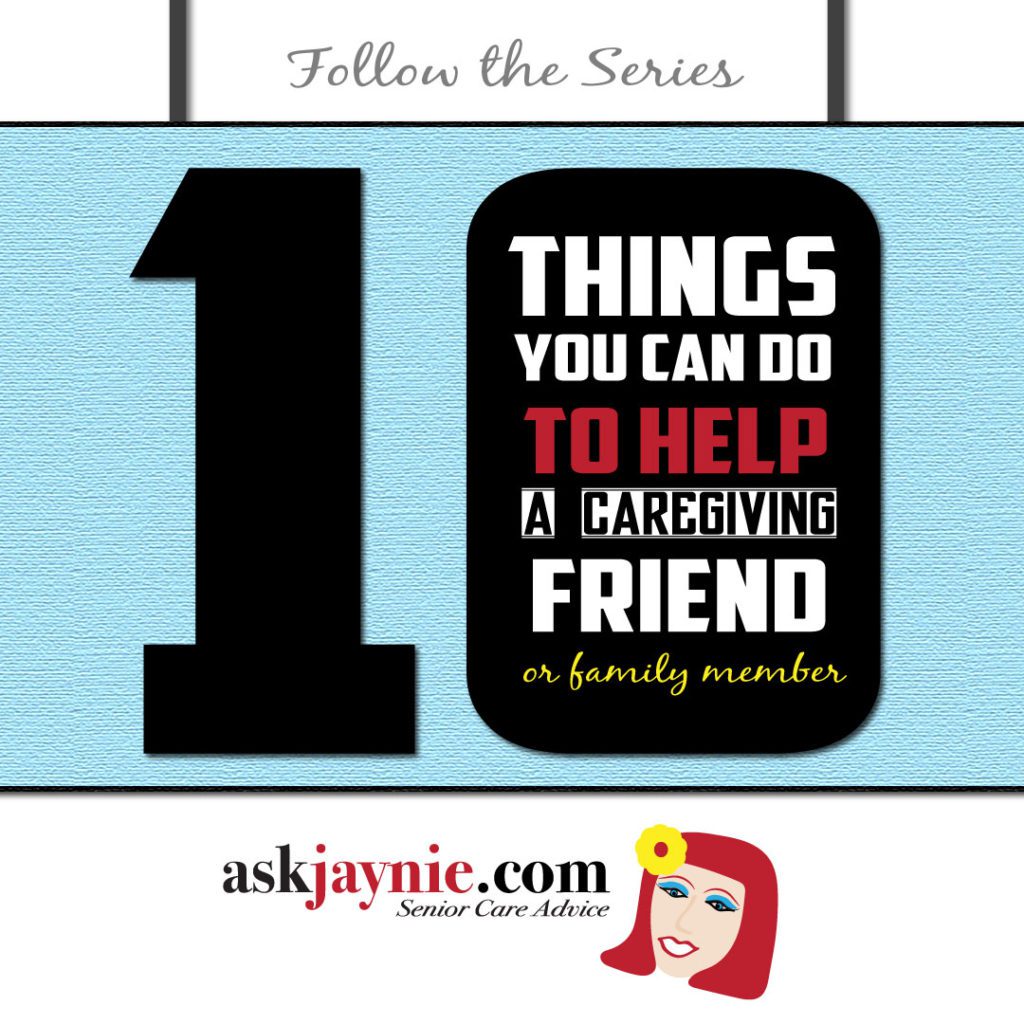How many of you feel completely alone in your role as a caregiver? Many of you have a HUGE extended family and lots of friends, but few are bringing to the table the support you need in your journey as a caregiver. Maybe they just don't know how they can help. Maybe they don't know what sort of a role they can play to make your life just a little easier. Maybe, we haven't been communicating what our actual needs are. In case you aren't sure just how someone might be able to pitch in to help you along, check out this list below. This might give you some great ideas to lighten you load. Forward this page to your friends and family. Don't assume your circle knows what your needs may be. Communication is the key. Tell them what they can do to help you make it through the difficult seconds, minutes, hours, days, and even years that you may be facing as a caregiver for a loved-one.
Here are some ideas for how friends
and family can help someone in the throws of a caregiving situation.
1. Chore Help
Schedule a time to stop in to help once a week with a few chores. Let your family/friends/neighbors know that you can do A, B or C. As follows, I can prepare some meals and bring them to you on Wednesday. Or, I can come by Friday to do the laundry and change the sheets on Mama's bed. Simply state what you feel you are able to do to help. Schedule it in as regularly as possible so the caregiver knows they can rely on you for your support.
2. Just Listen
Offer a shoulder to cry on and give a little time to listen and be of support. Tell your family/friend/nieghbor, that you will come by once a week and just let them just VENT. Believe me when I say, they need this. Tell them you may cry, you may yell, you may curse and you may just be silent and we can hold hands, but whatever it is that you need, that time will be all yours.
3. Run Errands
Offer to run a weekly errand to the store or run whatever errands are needed. Some caregivers don't have time to do normal everyday things like shopping or banking. Tell your person, I go shopping on Mondays, make a list and I will do that for you, or if you need something to go to the bank make out the deposit slip and sign the checks, I will do that for you. I go to the bank on Wednesdays.
Schedule a time as often as you can to sit with your friend's loved-one so they can take a nap, a bath, go shopping, and just have a little time for themselves. I can tell you this one thing can be a life saver. Tell them what you are comfortable with. i.e., I don't think I could take dad to the bathroom, or do any hands on care, that's just not me. But, if you want to get him all dressed and ready, I will come by and spend a few hours chatting, or play a game with him, etc. This should give you time for yourself.
5. Get them out!
Invite them out for a little time away from their caregiving situation. Maybe a family member would come and sit with mom so you can offer your friend an evening out for dinner and maybe a movie. Try to coordinate with the family, or arrange a caregiver for them, maybe your husband or daughter can help with a few hours of 'time out'.
6. Be a Fitness Buddy
Partner with your friend to make sure they are getting out, moving, and taking care of themselves physically and emotionally.
We all know the physical drain caregiving can be. Offer to walk with your friend/family/neighbor, or go to a club with them Exercise can absolutely be a life saver. You would be surprised, and you will get a benefit from it too.
7. Do your share
One child should not take on the entire role of caring for the parent when there are other children. Everyone should have a role in their care. Tell the the primary caregiver, to make a list/calendar of things that need to be done. Offer the list to all your family members to pick what they feel they are best at. Then put the assigned tasks on the calendar. If someone gets something they don't like, rotate the calendar so that everyone does that chore at least once a month or so. Don't let your sibling do this alone, this is your parent too.
8. Focus on the positive
Give the primary caregiver regular kudos and support. Stay away from the negative. It is already hard enough to handle a caregiving situation without having those surrounding you focus on what they think you are doing wrong. It can be hard to find the good in a terrible situation, but it is one of the most important things you need to do. I call it the "Pollyana Effect". Find a silver lining in every day. Compliment the primary caregiver on a job well done. 'If they had time' to shower, tell them how fresh they look and their hair looks lovely. Tell them how great mom is looking/doing, etc. You are doing a great job... These are little things that mean so much. Just the smallest criticism can ruin a caregiver's day after having spent every waking hour providing every aspect of care for someone. In order to get through this, they need to feel appreciated. They beat themselves up enough thinking they aren't being the perfect caregiver. There is no need for anyone else to add to the pot.

9. Financial Support
If you've got some change to spare, by all means offer some to the caregiver. One of the top reasons they are stressed is due to lack of financial support to bring in additional help. Divide up the financial burden amongst the entire family, not just one. Financial problems are key to giving proper care, and/or relief to a primary caregiver. If you cannot help with hands on caregiving, or are too far away, please consider being a financial support to your sibling who is doing this for your parent. This money could go to pay for a few hours of in-home care to help or give your sibling a respite.
 10. Be present
10. Be present Be a part of the entire process. There are so many things that go into the caregiving journey. Jump in from the beginning and stay abreast of what's going on and what is needed. Trying to fill family in at the end of the game when times are really tough can be ridiculously hard. Make sure when you do this you do not undermind the primary caregiver. Ask them if they want you to contact people and what they want you to share. Although this is a time when people should be informed of some things, not all things should be shared. You want to not only respect your parent, but the primary caregiver and what their needs are as well.
Hopefully this information helps families come together more while handling the care for a senior loved-one. If you need further guidance, advice, or support, please do not hesitate to reach out to our team. We hold a primary caregiver support group on the last Sunday of every month. See the links below to follow us on Facebook and Instagram to stay in the loop of when and where our next meeting will be held. It's called "Wine about your Aging Parents, BREW Up a Better Care Plan". We meet at a different winery, brewery, or coffee shop each month in the greater Sacramento area. Let's just say, it's not your "Average" primary caregiver support group.











